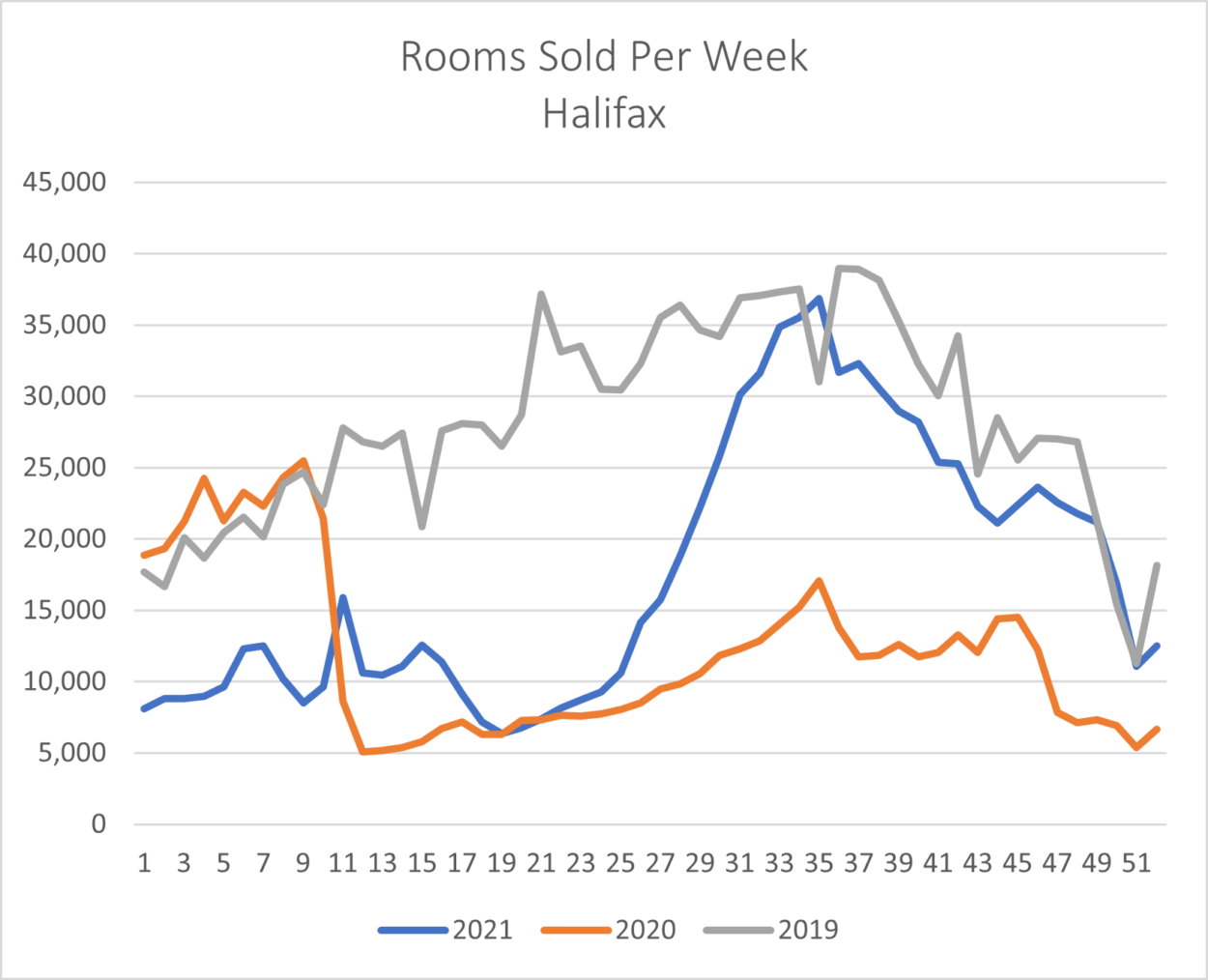Data released by Discover Halifax shows the total number of rooms sold in traditional hotels in the region was up 45 per cent in 2021 compared to 2020.
Data released by Discover Halifax shows the total number of rooms sold in traditional hotels in the region was up 45 per cent in 2021 compared to 2020. The third and fourth quarters demonstrated strong rebounds from a low of 80 per cent decline in previous quarters. Hotel stays were comparable to pre-pandemic numbers during certain weeks in Q3 and Q4. Discover Halifax tracks bookings at hotels and other accommodations as an indicator of tourism performance.
“These numbers do not tell the whole story, but based on early indicators of 2021 performance, it’s a positive sign that the tourism industry experienced a strong recovery in Halifax in the final two quarters,” says Ross Jefferson, President and CEO of Discover Halifax. “Tourism is vital to our economy and region. While it will take some time for tourism to rebound fully, 2021 performance and 2022 predictions offer optimism.”
Before the COVID-19 pandemic, Halifax experienced seven consecutive years of tourism growth. In 2019, there were approximately 5.3 million overnight stays in the region, with people spending more than $1.3 billion annually. Discover Halifax estimates that the Halifax region has lost approximately $1 billion in visitor spending since the beginning of the pandemic.
This past year, visitation began to rebound in July and August as border restrictions eased and comfort levels with travel increased. As a result, Halifax continued to experience a high level of visitation throughout the summer and into the fall. This trend aligned with a Conference Board of Canada report that projected pent-up demand amongst leisure travellers would drive high visitation.

Safely marketing the destination
“Throughout the summer and fall especially, Halifax was vibrant and alive. Business and industry partners took a collaborative approach and worked diligently to ensure Halifax was ready to safely welcome back visitors when the time was right,” says Jefferson.
A major milestone for Discover Halifax was the Reconnections marketing campaign. The campaign, which launched in July, marked the most significant marketing investment in the company’s history. It was also the first time Discover Halifax did mass advertising in urban Alberta and the Greater Toronto Area (GTA).
The campaign aimed to get Halifax on people’s consideration for 2022 travel. Research conducted to coincide with the campaign showed an 8 per cent increase in people in the urban Alberta and GTA markets who have added Halifax to their destination-of-choice lists for 2022.
Rebounding in 2022 and beyond
Destinations worldwide continue to deal with ongoing and long-term effects of the pandemic and new variants like Omicron. According to the Conference Board of Canada, while leisure travel is recovering. business travel is not expected to return to pre-pandemic levels fully until 2023-2024.
While it will take time for Halifax to return to the growth it was experiencing in 2019, initiatives like Halifax’s Integrated Tourism Master Plan, which was launched in March 2021, will be vital to the recovery and growth of the tourism industry. The plan will ensure well-managed sustainable growth and take a community-first approach.
Quick facts:
- the Halifax region has 52 major accommodations and over 1000 sharing economy accommodations
- traditional rooms sold in 2021 were still down 38 per cent, in comparison to pre-pandemic performance
- downtown Halifax hotels had a 64 per cent recovery from 2020 (39 per cent below pre-pandemic performance)
- suburban hotels had a 34 per cent recovery from 2020 (26 per cent below pre-pandemic performance)
- accommodations in the Airport region had a 65 per cent decrease compared to pre-pandemic performance
- hotels in Halifax have lost approximately $269 million in revenue since the pandemic started